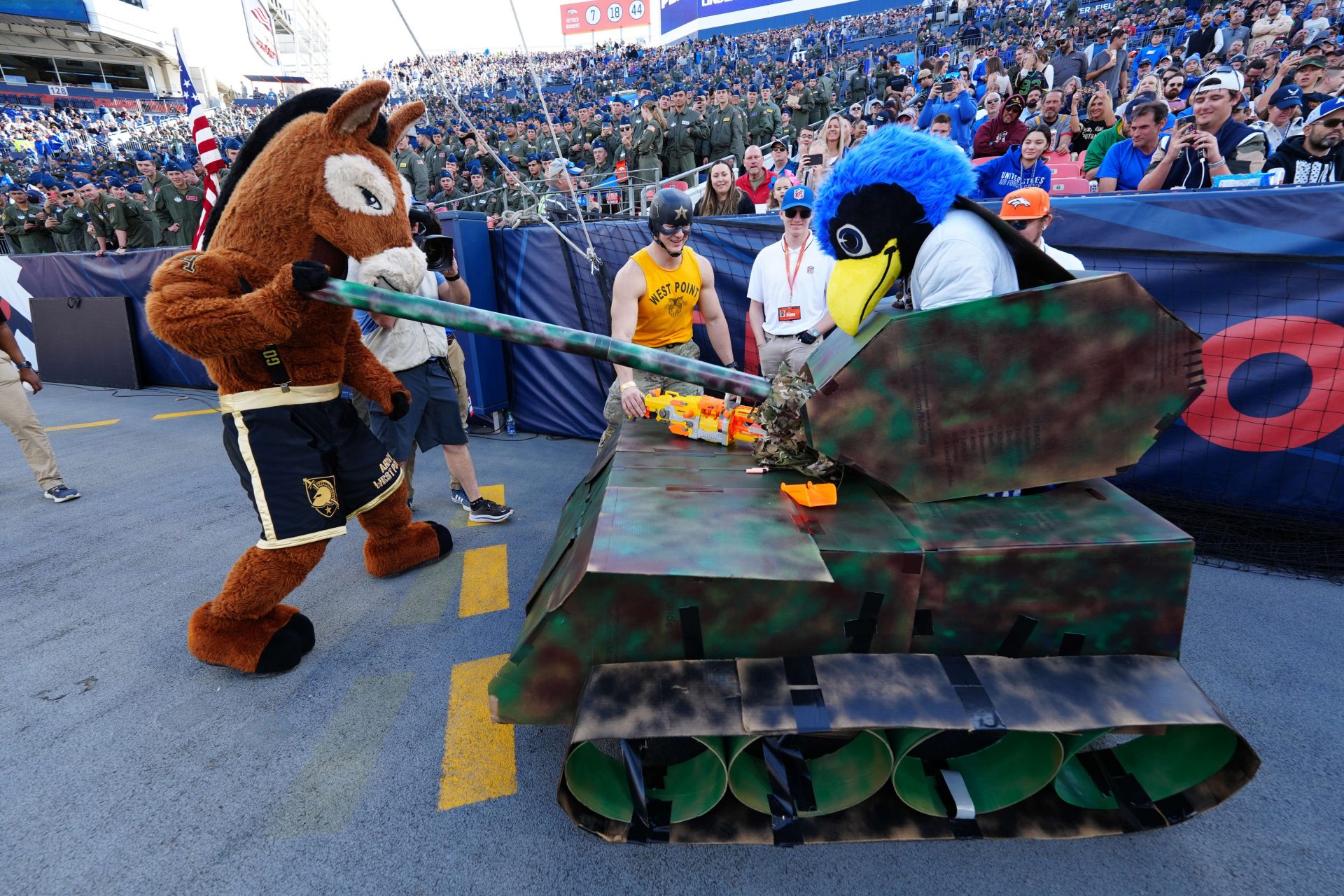The Army Black Knights have one of the most storied histories in college football, and their nickname and mascot are also steeped in a deep, rich history.
Army’s first-ever football game came back in 1890 against, of course, Navy.
At the time, Navy had an established football program and beat Army 24-0. But it didn’t take Army long to get up to speed, as it went on the road the following year and beat Navy 32-16 in Annapolis, Md. Thus, one of the best and oldest rivalry traditions in college football was born.
Army is well known as the Black Knights. But what isn’t as well known is why the Black Knights are represented by a live Mule.
How did an institution like Army settle on the Mule to represent their school as its mascot?

Who (or What) is the Army Black Knights Mascot?
Despite being the Black Knights, Army’s mascot is a mule whose name has changed with each live mascot.
The tradition of the Army mule mascot began in 1899 with an unlikely candidate — a mule that originally pulled an ice wagon.
To counter the Navy’s goat mascot in the annual rivalry game, an officer at the Philadelphia Quartermaster Depot decided Army needed its own symbol. The oversized white mule was carefully groomed, dressed in leggings, a collar, a gray blanket, and adorned with black, gold, and gray streamers on its ears and tail, marking the start of this enduring tradition.
The mule was selected as the Corps of Cadets’ mascot due to its significant role in military operations, where it was essential for transporting guns, supplies, and ammunition. Renowned for its strength, endurance, and resilience, the mule perfectly represents the qualities valued by the Corps of Cadets.
For years following the debut of the mule, cadets brought a mule to games, as documented in photos from the Academy’s annual publication, The Howitzer. However, details about these early mascots are scarce, as they were typically selected from the West Point stables with little formal recognition.
This changed in 1936 when “Mr. Jackson” was officially designated West Point’s first mule mascot. Three years later, in 1939, he was joined by “Pancho,” a small Ecuadorian burro. Pancho, also nicknamed “Skippy,” was a gift from Ecuadorian Ambassador Colon Alfaro, who presented the donkey to the Academy in the same year his sons, Eloy and Jaime, graduated.
“Mr. Jackson” remained the mascot until 1948, during which Army football enjoyed incredible success, including two national championships and a record of 83 wins, 28 losses, and 19 ties over his 12 years of service.
Today, this legacy is carried on by three mules, who are mascots for the U.S. Military Academy’s Corps of Cadets and appear at sporting events and public relations engagements.
Cadet Mule Riders train the current mascots, RANGER III and STRYKER. These riders are selected each spring from the fourth class based on their horsemanship, spirit, and leadership skills. As they progress through their cadet years, they will ultimately be promoted to Cadet-In-Charge of Mule Riders during their final year. Typically, there are three Mule Riders, each representing one of the upper classes.
Steve Townes, a 1975 graduate of West Point and former Army officer with the 75th Ranger Regiment, as well as a past mule rider and donor, stipulated that his donation of a mule to the Academy came with one condition: One of West Point’s mules must always be named “Ranger” in honor of all Army Rangers.
Why is Army the Black Knights?
In the early years of the football program, the Academy’s football team earned the nickname “The Black Knights of the Hudson,” inspired by the predominantly black uniforms they wore against the imposing, castle-like buildings of West Point.
Over time, this nickname was shortened to “Black Knights.”
In 1999, the Academy officially embraced “Black Knights” as the unified identity for all its sports teams.
What began as a nickname for the football team evolved into a cohesive brand for West Point athletics, symbolizing a storied past and a bold vision for the future.
The Black Knights’ legacy goes beyond their distinctive uniforms; it embodies the values they represent. Cadet athletes are leaders on and off the field, upholding West Point’s proud traditions.
College Football Network has you covered with the latest news and analysis, rankings, transfer portal information, top 10 returning players, the 2024 college football season schedule, and much more!

